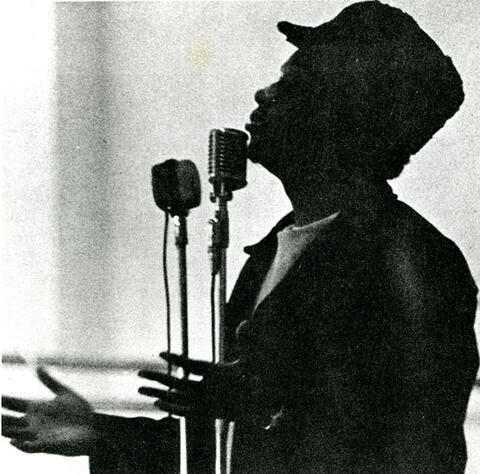
Title and statement of responsibility area
Title proper
Black Panthers - Fred Hampton
General material designation
- Graphic material
Parallel title
Other title information
Title statements of responsibility
Title notes
Level of description
Item
Reference code
Edition area
Edition statement
Edition statement of responsibility
Class of material specific details area
Statement of scale (cartographic)
Statement of projection (cartographic)
Statement of coordinates (cartographic)
Statement of scale (architectural)
Issuing jurisdiction and denomination (philatelic)
Dates of creation area
Date(s)
-
1969 (Creation)
Physical description area
Physical description
1 negative : b&w ; 10.16 x 12.7 cm
Publisher's series area
Title proper of publisher's series
Parallel titles of publisher's series
Other title information of publisher's series
Statement of responsibility relating to publisher's series
Numbering within publisher's series
Note on publisher's series
Archival description area
Name of creator
Custodial history
Scope and content
Reproduction of a photograph of Fred Hampton, a Black Panther group member who spoke on campus, that appeared in the 14 Nov. 1969 vol. 59 no 24 edition of The Sheaf.
Bio/Historical Note: On 17 November 1969, three members of the Illinois chapter of the Black Panthers addressed four separate campus audiences during a tour of western Canadian universities. Their stop in Saskatoon was cut short a few days later with the deportation of two of the three. A week later the most dynamic of the speakers, Fred Hampton, was dead - shot to death in his bed by Chicago police. Formed in 1966 by chairman Bobby Seals, the Marxist-Leninist Black Panthers advocated the use of violence to obtain political goals. Rapid growth, accelerating violence, and calls for the overthrow of the government, by 1969 had brought the Panthers into a protracted and violent struggle with the American authorities. The U of S, like other Canadian and American universities, had become increasingly radicalized during the late sixties. The visit by the Panthers was but one in a parade of militant protest groups that addressed campus audiences. The three Panthers outlined the party's ten-point program and emphasized their peace-loving nature, assuring those present that they were not fighting the whites, but people, white and black, who were reactionary. When questioned about the party's policy on violence, Fred Hampton, deputy minister of information, said: "if a man kicks our door down then we'll blow his brains out. If he doesn't want his brains blown out then he'll knock on the door." Accusations levelled by Saskatchewan Attorney-General Darrell Heald that the Panthers were stirring up sedition among Indigenous people precipitated an investigation by immigration authorities. It was found that two of the three were travelling under false papers. The third, Fred Hampton, left Canada voluntarily. Hampton's death a week later would not have surprised the twenty-one year old who had stated flatly while in Saskatoon, "Panthers never live to retirement age." Judas and the Black Messiah is a 2021 American biographical drama film about the betrayal of Hampton by William O'Neal, an FBI informant.

